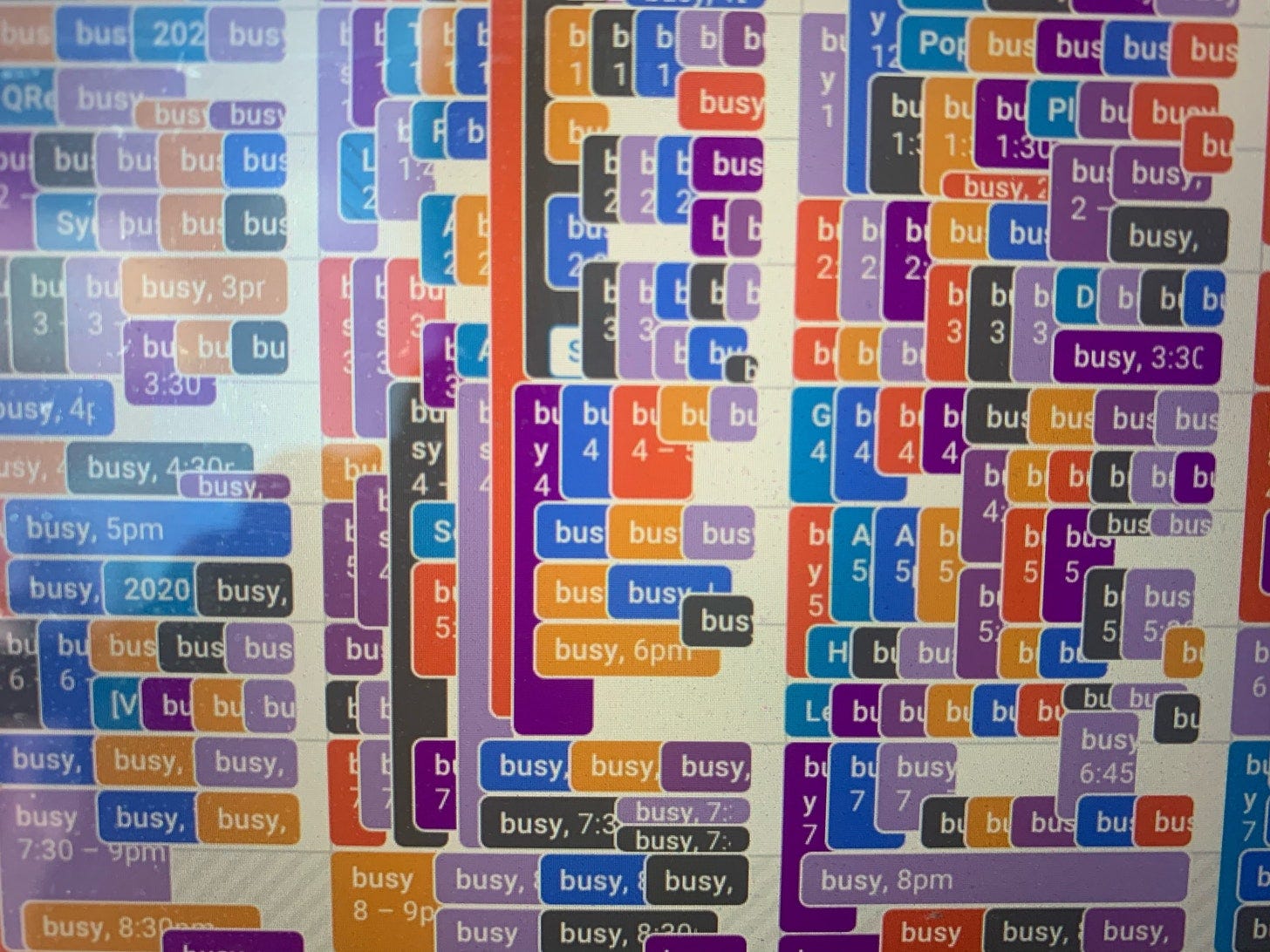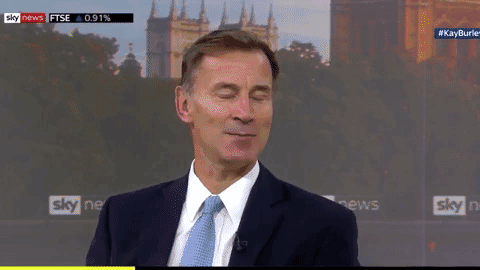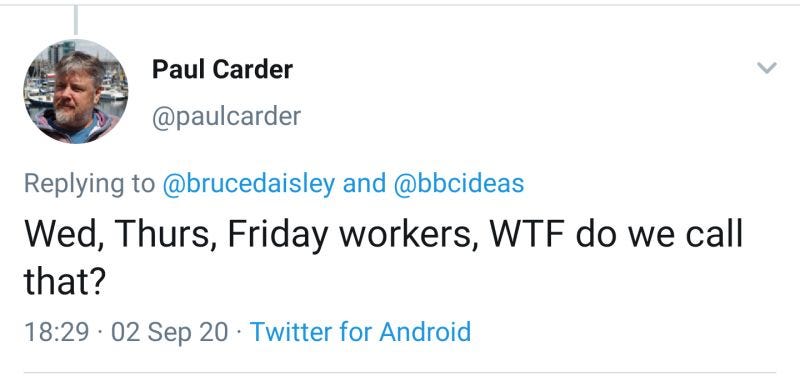Locked down, burned out, go for it
ALSO: WTF do we call new ways of working / all the data you need

photo from Sophie Dominguez
Last year Anne Helen Petersen’s Buzzfeed article about burnout became a viral sensation, spawning a seemingly never-ending wave of ‘Year of Burnout’ headlines. Petersen’s writing triggered such recognition because she rooted it in the ordinary, in everyday experiences that were instantly relatable. She evoked her own life where industrious professional productivity (as a writer) was combined with a weary inability to get things done in her private life.
She initially thought there was something wrong with her. Googling for other people relating their aversion to getting sh!t done domestically, bills sitting unpaid, registrations unfiled, postal votes uncast, chores uncompleted. She realised it wasn’t personal, it was systematic. The way we were living was driving us to a constant feeling of being emotionally & physically spent.
Relatedly, it was sad to read of the passing of David Graeber this week. As an academic he was an unexpected icon of progressive politics but more than anything he was someone who invited us to revisit our preconceived ideas about how society functioned. Graeber had mused in his book ‘Bullshit Jobs’, wondering what had happened to the 15-hour week that in 1930 John Maynard Keynes had predicted by the end of the 20th century. He wondered whether it was indeed possible but societally we might have to reorganise the world of work to achieve it. Insurgent thinking for many, but there are echoes of this conjecture in Petersen’s book. Some of her thoughts might find resonance with frazzled younger workers wondering why they won’t be free of their student loans until 2045 and looking at house prices simmering away at 10 times their salary.
AHP reminds us that despite a whole genre of self-improvement literature that tells us that our personal actions can resolve burnout - or that, come on slouch, you need to be grittier, we need to point the finger at the actions of our firms, not ourselves. Ultimately she suggests that our casual acceptance of the way we’re working is having a toll on our psyche that can’t be easily unspun by productivity hacks and meditation apps. As Taylor Lorenz notes on the jacket, the book “is a compelling exploration of… how an entire generation has been set up to fail”.
As many of us settle down for the uncertainty of the second half of the working year, burnout is going to become a real issue. As Petersen so succinctly reminds us, “Energy is finite and when you keep trying to pretend it isn’t - that’s when burnout arrives.”
I’m in the middle of writing a book at the moment and there’s a quotation in my research from American sociologist Edward Alsworth Ross that sprung to mind (stick with this, it has huge implications for us all):
‘The chief oppositions which occur in society are between individuals, sexes, ages, races, nationalities, sections, classes, political parties and religious sects.
Several such may be in full swing at the same time, but the more numerous they are the less menacing is any one.
Every species of conflict interferes with every other species in society at the same time, save only when their lines of cleavage coincide; in which case they reinforce one another…
A society, therefore, which is riven by a dozen oppositions along lines running in every direction, may actually be in less danger of being torn with violence or falling to pieces than one split along just one line”.
In other words when one group, the young, is in systematic disagreement with another group, their elders over issues of wealth and racial perspective and professional experience and environmentalism, and when all of these matters of identity cleave on the same divide such schisms have historically been a recipe for explosive conflict. It’s hard not to look at the scenes in the US right now and reflect on that thought. As we look forwards contemplating 10, 12, 15% unemployment it’s worth heeding that historians tell us that when there has been our contemporary levels of income disparity they have been traditionally resolved by war, famine or revolution.
It could never happen here, of course, generational exceptionalism etc.
Can’t Even by Anne Helen Petersen is out on September 22nd, pre-order now. BTW podcast listeners, I got in touch with her and was thrilled to talk to her about it on today’s episode of Eat Sleep Work Repeat - listen here: Apple/Spotify/Acast). Her newsletter is here.
In Britain, the irascible host of The Apprentice UK, Lord Sugar weighed into the debate about getting back to work. He wants everyone back to the office ASAP! “Go to Whitehall and the place is half empty. Where are they all? The Government needs to say: “Get your arses back in there now.”
Someone helpfully pointed out that he has more than a dog in this fight, while Sugar came to fame selling cut price electronics in the UK almost all of his wealth these days comes from commercial property. If you wanted to lend some support, Sugar Superfans should note that his company has plenty of unoccupied space right now.

The highlight of the Sugar piece was this photo which appears to show a cut scene from Black Mirror where the office manager is about to get Tasered after defying several warnings about not observing social distancing on the contract cleaner.
Resources to share: A summary of data and evidence of how attitudes to work are changing (good one to share with your boss/team)
Popular posts: The Culture Wars of Work, Tuesday/Wednesday/Thursday? What will the new office of the future look like? The 12 Questions Every Firm Should be Asking, Whiteboarding the New Rules, Office Culture Crumbling Before Our Eyes, Setting a Date for September?


Remote work prevents young workers from building networks outside of their immediate colleagues. “People end up talking to their co-workers—complimenting a new haircut, asking how the kids are—when they’re corralled together waiting for the elevator or washing their hands next to each other in the bathroom. Over time, those quick encounters build a sense of belonging and warmth that makes spending so much of your life at work a little more bearable”. Readable piece in The Atlantic
Nice, 69% of CEOs say they plan to downsize the size of the office - and they believe remote working has actually improved communication
The big winners of Covid in 2022 will be conferences. Here’s a paper saying that the academics who attend conferences are more collaborative and more innovative
Real estate Drog Poleg expert believes that in the same way offices in the last few years had to offer previously overlooked dimensions like interior design and social vibe, so now cities will aggressively compete to be more attractive remote working destinations
“For many of us, the commute is part of who we are — and it serves a useful purpose” - newspapers telling us that the commute is part of our identity feels like something from propaganda
Netflix founder Reid Hastings sees no positives in remote working (this article is paid but there’s a good, free video on Netflix culture which makes it clear the ‘no limit to vacation’ rule meant no vacation)
“The real estate business is no longer just about real estate” - anyone who reads this knows I am an Antony Slumber superfan, his podcast here is more of an audio OpEd but great nevertheless
WTF do we call the new ways of working?

Ok team, the naming conventions of new workers are taking shape:
TW&T - Tuesday, Wednesday & Thursday
WTF - Wednesday, Thursday & Friday
MFs - Monday & Friday (proposing to to the chair that we style these people “MoFos.”
OAF - once a fortnight
Please get in touch if you’ve got any other suggestions. I’ll add them to my laminated sheet.
Make Work Better is created by Bruce Daisley, workplace culture enthusiast. You can find more about Bruce’s book, podcast and writing at the Eat Sleep Work Repeat website.



